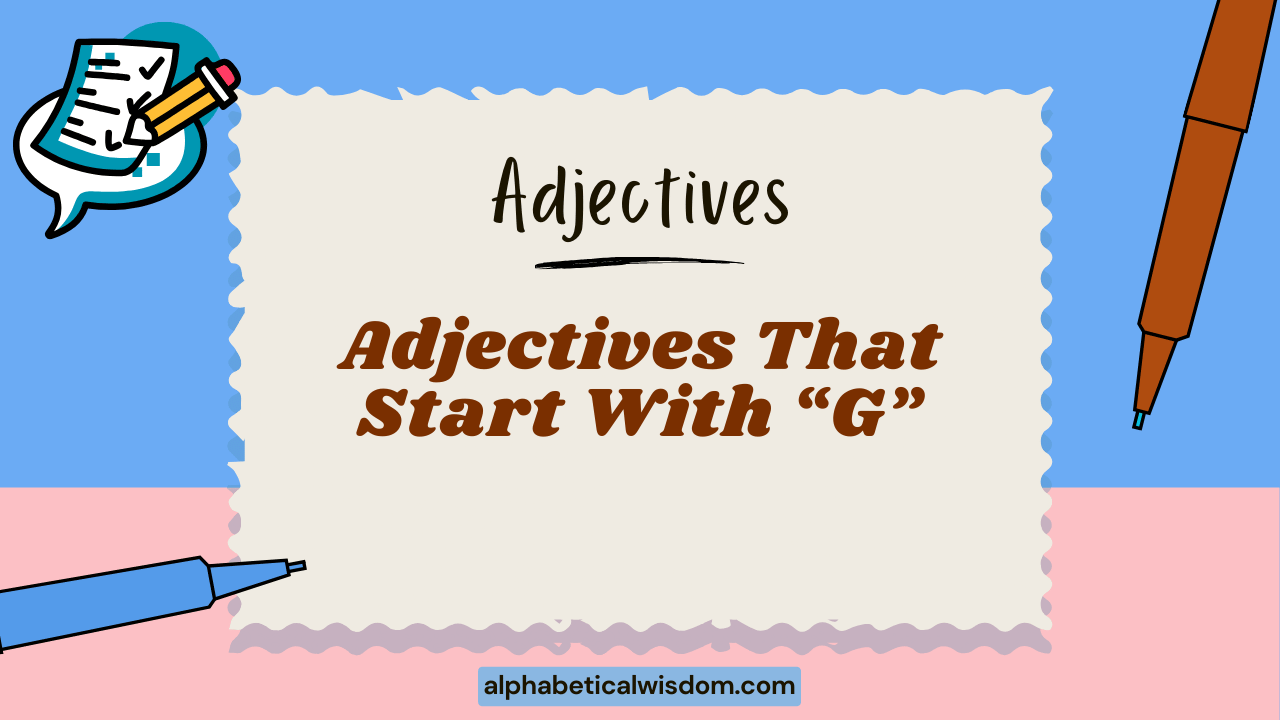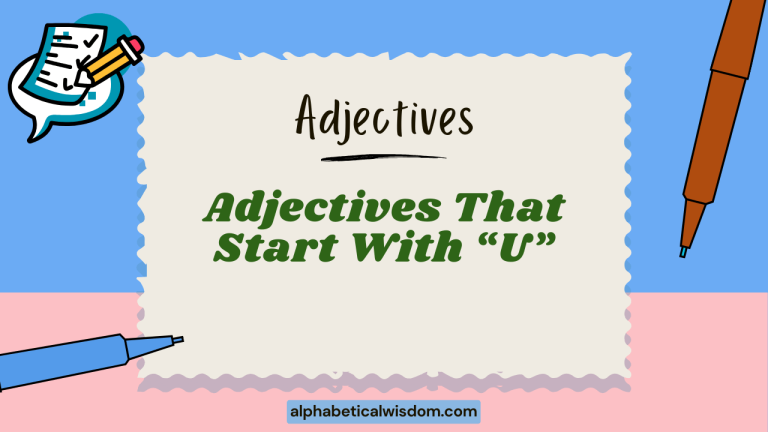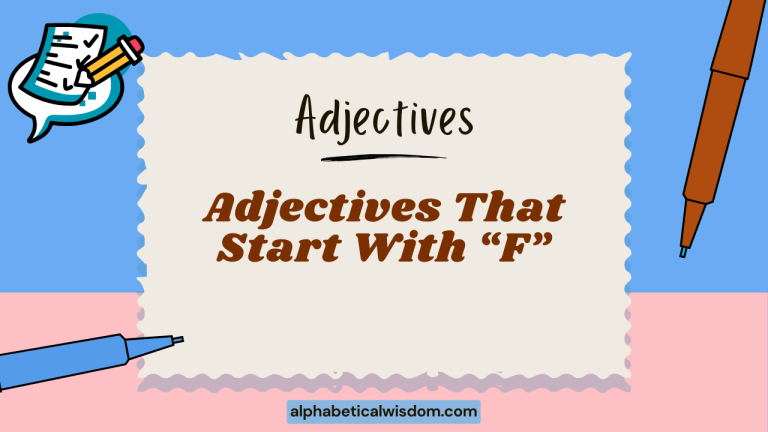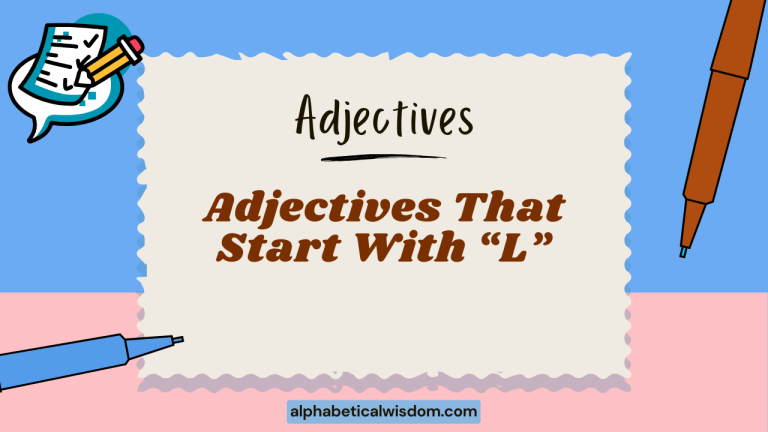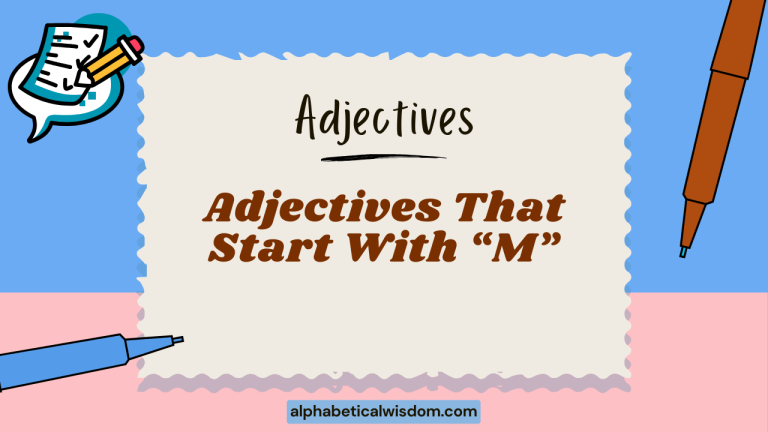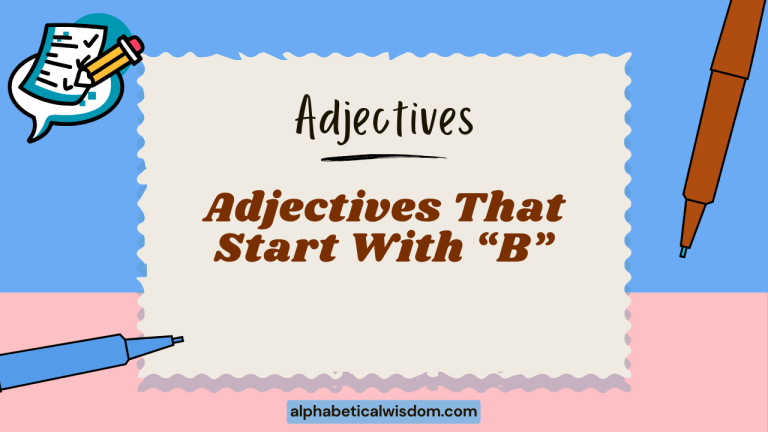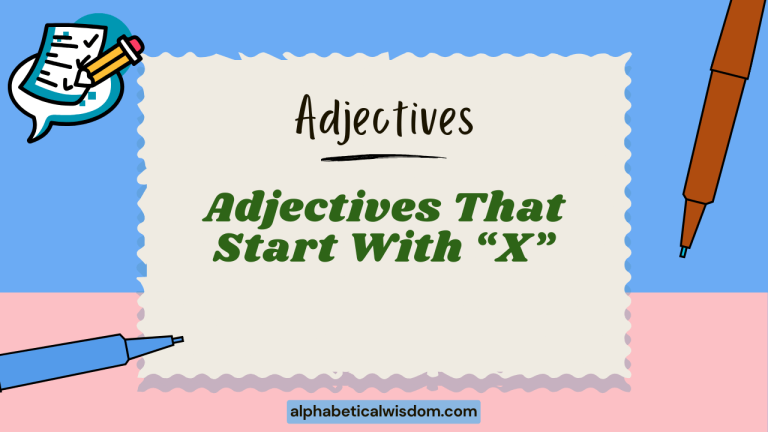Adjectives That Start With G: A Comprehensive Grammar Guide
Adjectives are the descriptive powerhouses of the English language, enriching our sentences and painting vivid pictures with words. Understanding and using a wide range of adjectives, including those starting with the letter “G,” is crucial for effective communication.
This article provides an in-depth exploration of adjectives that begin with “G,” covering their meanings, usage, and common pitfalls. Whether you’re an English language learner or a seasoned writer, this guide will enhance your vocabulary and grammar skills.
Table of Contents
- Introduction
- Definition of Adjectives
- Structural Breakdown of Adjectives
- Types of Adjectives
- Examples of Adjectives Starting With G
- Usage Rules for Adjectives
- Common Mistakes with Adjectives
- Practice Exercises
- Advanced Topics
- Frequently Asked Questions (FAQ)
- Conclusion
Introduction
Adjectives are essential components of the English language, serving to describe and modify nouns or pronouns. Mastering adjectives, including those beginning with the letter “G,” allows for more precise and engaging communication.
This article offers a comprehensive guide to adjectives starting with “G,” explaining their meanings, proper usage, and common errors to avoid. It is designed for English language learners, writers, and anyone seeking to improve their command of the English language.
By exploring these adjectives, we aim to enhance your vocabulary and grammatical proficiency.
Definition of Adjectives
An adjective is a word that modifies or describes a noun or pronoun. Adjectives provide additional information about the qualities, characteristics, or attributes of the nouns or pronouns they modify. They answer questions such as “What kind?”, “Which one?”, “How many?”, or “How much?” about the noun or pronoun they describe. Adjectives are crucial for creating vivid and detailed descriptions in both spoken and written language.
Classification of Adjectives
Adjectives can be classified based on their function and the type of information they provide:
- Descriptive Adjectives: Describe the qualities or characteristics of a noun (e.g., green, tall, beautiful).
- Quantitative Adjectives: Indicate the quantity or amount of a noun (e.g., few, many, several).
- Demonstrative Adjectives: Point out specific nouns (e.g., this, that, these, those).
- Possessive Adjectives: Show ownership or possession (e.g., my, your, his, her, its, our, their).
- Interrogative Adjectives: Used in questions to ask about nouns (e.g., which, what, whose).
- Proper Adjectives: Derived from proper nouns and modify other nouns (e.g., Italian, American, Shakespearean).
Function of Adjectives
The primary function of adjectives is to modify nouns or pronouns, providing more specific details about them. Adjectives can appear before the noun they modify (attributive position) or after a linking verb (predicative position). They enhance the clarity and richness of sentences by adding descriptive elements. For example, instead of saying “The car is fast,” you could say “The green car is incredibly fast,” using adjectives to provide more detail.
Contexts of Adjectives
Adjectives are used in various contexts, including:
- Descriptive Writing: To create vivid imagery and detailed descriptions of people, places, and things.
- Narrative Writing: To develop characters and settings, adding depth and realism to stories.
- Expository Writing: To provide factual information and explain concepts clearly.
- Persuasive Writing: To influence readers’ opinions and attitudes by using strong and evocative adjectives.
- Everyday Conversation: To express opinions, share observations, and provide information about the world around us.
Structural Breakdown of Adjectives
Understanding the structure of adjectives can help you use them correctly and effectively. Adjectives can be simple words, compound words, or phrases.
Simple Adjectives
Simple adjectives consist of a single word that directly modifies a noun. These are the most common types of adjectives and are straightforward to use. For example, good, great, grand, and green are all simple adjectives.
Compound Adjectives
Compound adjectives are formed by combining two or more words, often connected by a hyphen. These adjectives function as a single unit to describe a noun. Examples include good-looking, well-known, and gravity-defying. The hyphen helps to clarify that the words should be interpreted as a single adjective.
Adjective Phrases
An adjective phrase is a group of words that functions as an adjective, modifying a noun or pronoun. These phrases typically include a preposition and a noun or pronoun. For example, “a house with a green roof” uses the phrase “with a green roof” to describe the house.
Order of Adjectives
When using multiple adjectives to describe a noun, there is a general order to follow. This order helps ensure that the description sounds natural and clear.
The typical order is:
- Opinion: Describes a subjective quality (e.g., beautiful, ugly).
- Size: Describes the physical dimensions (e.g., large, small).
- Age: Describes how old something is (e.g., old, new).
- Shape: Describes the form or outline (e.g., round, square).
- Color: Describes the hue (e.g., green, blue).
- Origin: Describes where something comes from (e.g., German, French).
- Material: Describes what something is made of (e.g., wooden, metal).
- Purpose: Describes what something is used for (e.g., sleeping bag, writing desk).
For example, “a beautiful large old round green German wooden table.” While it’s rare to use so many adjectives at once, this order provides a guideline for arranging them effectively.
Types of Adjectives
Adjectives can be categorized into different types based on their function and the kind of information they provide. Understanding these types can help you use adjectives more effectively.
Descriptive Adjectives Starting With G
Descriptive adjectives are used to describe the qualities or characteristics of a noun. Here are some examples of descriptive adjectives that start with “G”:
- Generous: Willing to give or share unstintingly.
- Gentle: Mild in temperament or behavior; kind and tender.
- Genuine: Truly what something is said to be; authentic.
- Glamorous: Attractive in an exciting and special way.
- Gleaming: Shining brightly, especially with reflected light.
- Glorious: Magnificent; delightful.
- Golden: Made of or resembling gold.
- Good: Of high quality, excellent.
- Graceful: Elegant and refined in movement or appearance.
- Grand: Magnificent and imposing in appearance or size.
- Grateful: Feeling or showing an appreciation of kindness; thankful.
- Great: Of an extent, amount, or intensity considerably above the average.
- Green: Of the color between blue and yellow in the spectrum; colored like grass or emeralds.
- Gregarious: Fond of company; sociable.
- Grim: Forbidding or uninviting.
- Gripping: Exciting or interesting in a way that keeps your attention.
- Groovy: Fashionable and exciting.
- Gross: Repulsively large or overweight.
- Guarded: Cautious and careful.
- Guiding: Providing help or advice.
Quantitative Adjectives Starting With G
Quantitative adjectives indicate the quantity or amount of a noun. While there are fewer quantitative adjectives starting with “G,” they still play a role in specifying amounts.
- Great (in quantity): Large in number or amount. Example: a great number of opportunities.
- Gross (in amount): Total; without deductions. Example: gross income.
Other Adjective Types Starting With G
Other types of adjectives, such as demonstrative, possessive, interrogative, and proper adjectives, are less commonly found starting with the letter “G.” However, proper adjectives derived from place names or people’s names beginning with “G” can be used.
- Georgian: Relating to the period of the British kings George I-IV.
- German: Relating to Germany, its people, or their language.
Examples of Adjectives Starting With G
This section provides extensive examples of adjectives starting with “G” in various contexts. Each table includes multiple sentences to illustrate the usage of these adjectives.
Descriptive Adjectives Examples
The following table illustrates the use of descriptive adjectives starting with “G.”
| Adjective | Example Sentence |
|---|---|
| Generous | The generous donor contributed a large sum to the charity. |
| Gentle | The gentle breeze rustled the leaves. |
| Genuine | The antique dealer confirmed that the painting was genuine. |
| Glamorous | She wore a glamorous gown to the awards ceremony. |
| Gleaming | The gleaming surface of the polished car reflected the sunlight. |
| Glorious | The team celebrated their glorious victory. |
| Golden | The fields of wheat turned golden in the autumn sun. |
| Good | He is a good student and always does his best. |
| Graceful | The ballerina’s movements were graceful and fluid. |
| Grand | The grand hotel overlooked the ocean. |
| Grateful | I am grateful for all the support I have received. |
| Great | That was a great movie; I really enjoyed it. |
| Green | The green grass was lush and vibrant. |
| Gregarious | She is a gregarious person who loves to socialize. |
| Grim | The grim weather made us stay indoors. |
| Gripping | The novel had a gripping plot that kept me reading all night. |
| Groovy | The music had a groovy beat that made everyone want to dance. |
| Gross | The gross amount of waste produced each day is alarming. |
| Guarded | He gave a guarded response, careful not to reveal too much. |
| Guiding | The guiding principles of the organization are integrity and compassion. |
| Gifted | She is a gifted musician. |
| Gigantic | The gigantic statue towered over the square. |
| Glacial | The glacial pace of the project was frustrating. |
| Gradual | There was a gradual improvement in his health. |
| Graphic | The graphic details of the crime were disturbing. |
| Grave | The grave situation required immediate action. |
| Gray | The gray sky threatened rain. |
Quantitative Adjectives Examples
The following table illustrates the use of quantitative adjectives starting with “G.”
| Adjective | Example Sentence |
|---|---|
| Great (in quantity) | There is a great demand for skilled workers in this industry. |
| Gross (in amount) | The company reported a gross profit of $1 million. |
| Growing | There is a growing concern about climate change. |
| Galore | Prizes galore were awarded at the event. |
Proper Adjectives Examples
The following table illustrates the use of proper adjectives starting with “G.”
| Adjective | Example Sentence |
|---|---|
| Georgian | The house was built in the Georgian style. |
| German | He studied German literature at university. |
| Greek | We visited the ancient Greek ruins. |
| Ghanaian | She wore traditional Ghanaian clothing. |
| Guatemalan | They served delicious Guatemalan coffee. |
Compound Adjectives Examples
The following table illustrates the use of compound adjectives starting with “G.” Note that not many common compound adjectives start with “G,” but examples can be constructed.
| Adjective | Example Sentence |
|---|---|
| Gravity-defying | The acrobat performed a gravity-defying stunt. |
| Green-eyed | The green-eyed monster of jealousy crept into his heart. |
| Good-natured | He was a good-natured man. |
Usage Rules for Adjectives
Adjectives must be used correctly to ensure clear and effective communication. This section covers the rules governing the proper use of adjectives.
Placement of Adjectives
Adjectives typically precede the noun they modify (attributive position). However, they can also follow a linking verb, such as be, seem, look, feel, taste, or smell (predicative position). In the attributive position, the adjective comes before the noun: “a green car.” In the predicative position, the adjective follows the linking verb: “The car is green.”
Comparative and Superlative Forms
Adjectives have comparative and superlative forms to indicate degrees of comparison. For most one-syllable adjectives, the comparative form is created by adding “-er” and the superlative form by adding “-est” (e.g., great, greater, greatest). For longer adjectives, the comparative form is created by adding “more” and the superlative form by adding “most” (e.g., glamorous, more glamorous, most glamorous).
Coordinate Adjectives
Coordinate adjectives are adjectives that equally modify the same noun. They are separated by commas. To determine if adjectives are coordinate, you can try inserting “and” between them. If the sentence still makes sense, the adjectives are coordinate (e.g., “a generous, kind person”).
Non-coordinate Adjectives
Non-coordinate adjectives do not equally modify the same noun and should not be separated by commas. They often describe different aspects of the noun (e.g., “a grand old house”).
Exceptions and Special Cases
Some adjectives have irregular comparative and superlative forms (e.g., good, better, best). Additionally, some adjectives are considered absolute and cannot be compared (e.g., unique, perfect). It is also important to avoid using double comparatives or superlatives (e.g., “more better” or “most best”).
Common Mistakes with Adjectives
Several common mistakes can occur when using adjectives. Being aware of these errors can help you avoid them.
Incorrect Placement
Placing adjectives in the wrong position can lead to confusion. Ensure that adjectives are placed either before the noun they modify or after a linking verb.
Incorrect: The car red.
Correct: The red car.
Misusing Comparative and Superlative Forms
Using the wrong comparative or superlative form can change the meaning of the sentence.
Incorrect: She is more taller than her sister.
Correct: She is taller than her sister.
Incorrect Use of Commas
Using commas incorrectly between adjectives can disrupt the flow of the sentence.
Incorrect: a generous, kind, person.
Correct: a generous, kind person.
Double Comparatives and Superlatives
Using double comparatives or superlatives is grammatically incorrect.
Incorrect: This is the most best movie ever.
Correct: This is the best movie ever.
Confusing Adjectives with Adverbs
Adjectives modify nouns, while adverbs modify verbs, adjectives, or other adverbs. Confusing the two can lead to incorrect sentences.
Incorrect: He sings good.
Correct: He sings well.
Practice Exercises
Test your understanding of adjectives starting with “G” with these practice exercises.
Exercise 1: Fill in the Blanks
Fill in the blanks with an appropriate adjective starting with “G.”
| Question | Answer |
|---|---|
| 1. The _________ sunset painted the sky with vibrant colors. | glorious |
| 2. She is a _________ person who always helps others. | generous |
| 3. The _________ giant towered over the small village. | gigantic |
| 4. The _________ breeze made the summer day pleasant. | gentle |
| 5. The _________ artifact was carefully preserved in the museum. | genuine |
| 6. The actress wore a _________ dress to the premiere. | glamorous |
| 7. The _________ floor reflected the light beautifully. | gleaming |
| 8. He is a _________ student who always gets good grades. | good |
| 9. The dancer’s movements were _________ and elegant. | graceful |
| 10. The _________ hotel offered stunning views of the city. | grand |
Exercise 2: Identify the Adjective
Identify the adjective starting with “G” in each sentence.
| Question | Answer |
|---|---|
| 1. The green grass swayed in the wind. | green |
| 2. She is a gregarious individual who loves parties. | gregarious |
| 3. The grim reality of the situation was hard to accept. | grim |
| 4. The movie had a gripping plot that kept me on the edge of my seat. | gripping |
| 5. The song had a groovy rhythm that made everyone dance. | groovy |
| 6. The gross amount of trash was shocking. | gross |
| 7. He gave a guarded answer to the question. | guarded |
| 8. She is grateful for all the help she has received. | grateful |
| 9. It was a great experience visiting Europe. | great |
| 10. He is a gifted artist. | gifted |
Exercise 3: Correct the Sentence
Correct the sentences with the incorrect use of adjectives starting with “G.”
| Incorrect Sentence | Correct Sentence |
|---|---|
| 1. He is more good than his brother. | He is better than his brother. |
| 2. This is the most greatest achievement. | This is the greatest achievement. |
| 3. The car green is mine. | The green car is mine. |
| 4. She is a generous, kind, person. | She is a generous, kind person. |
| 5. He sings good. | He sings well. |
Advanced Topics
For advanced learners, understanding more complex aspects of adjectives can further enhance their language skills.
Adjective Clauses
An adjective clause is a dependent clause that modifies a noun or pronoun. It functions like an adjective, providing additional information about the noun it modifies. Adjective clauses typically begin with relative pronouns (who, whom, which, that) or relative adverbs (when, where, why). For example, “The book that I borrowed from the library is very interesting.”
Participles as Adjectives
Participles, which are verb forms ending in “-ing” (present participle) or “-ed/-en” (past participle), can function as adjectives. They describe the noun by indicating an action or state. For example, “the running water” (present participle) and “the broken window” (past participle).
Adjectives with Specific Prepositions
Some adjectives are commonly used with specific prepositions to form set phrases. For example, “grateful for,” “good at,” and “guilty of.” Knowing these combinations can improve your fluency and accuracy.
Frequently Asked Questions (FAQ)
Here are some frequently asked questions about adjectives.
- What is the difference between an adjective and an adverb?
Adjectives modify nouns or pronouns, providing descriptive information about them. Adverbs, on the other hand, modify verbs, adjectives, or other adverbs, providing information about how, when, where, or to what extent something is done. For example, “a beautiful flower” (adjective) vs. “She sings beautifully” (adverb).
- Can a noun be used as an adjective?
Yes, a noun can be used as an adjective. This is called a noun adjunct or attributive noun. For example, “a school bus” (school is a noun used to modify the noun bus).
- What are possessive adjectives?
Possessive adjectives indicate ownership or possession. They include my, your, his, her, its, our, and their. For example, “This is my book.”
- How do I use multiple adjectives correctly?
When using multiple adjectives, follow the general order of adjectives: opinion, size, age, shape, color, origin, material, and purpose. Separate coordinate adjectives with commas but do not separate non-coordinate adjectives.
- What are some common mistakes to avoid when using adjectives?
Common mistakes include incorrect placement of adjectives, misusing comparative and superlative forms, incorrect use of commas, using double comparatives or superlatives, and confusing adjectives with adverbs.
- Are there adjectives that cannot be compared?
Yes, some adjectives are considered absolute and cannot be compared. These include words like unique, perfect, and absolute. It doesn’t make sense to say something is “more unique” or “most perfect” because these qualities are already absolute.
- How can I improve my use of adjectives in writing?
To improve your use of adjectives, read widely to observe how skilled writers use them, practice using a variety of adjectives in your own writing, and pay attention to the specific nuances of different adjectives to choose the most appropriate word for each context. Consider using a thesaurus to expand your vocabulary.
- What is the difference between descriptive and limiting adjectives?
Descriptive adjectives describe the qualities or characteristics of a noun (e.g., beautiful, tall). Limiting adjectives, also known as determiners, specify the quantity or identity of a noun (e.g., a, the, some, this). Descriptive adjectives add detail, while limiting adjectives narrow down or identify the noun.
- Can adjectives be modified by adverbs?
Yes, adjectives can be modified by adverbs. Adverbs can intensify or qualify the meaning of an adjective. For example, in the phrase “incredibly beautiful,” the adverb “incredibly” modifies the adjective “beautiful.”
Conclusion
Mastering adjectives, particularly those starting with the letter “G,” is essential for enhancing your English language skills. This comprehensive guide has covered the definition, structure, types, usage rules, and common mistakes associated with adjectives.
By understanding these concepts and practicing regularly, you can improve your vocabulary, grammar, and overall communication skills. Remember to pay attention to the placement of adjectives, use comparative and superlative forms correctly, and avoid common errors.
Continue to explore and expand your knowledge of adjectives to become a more proficient and confident English speaker and writer.
